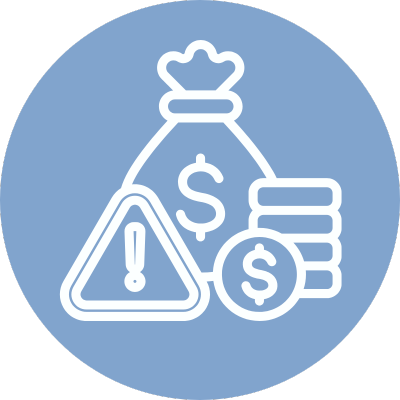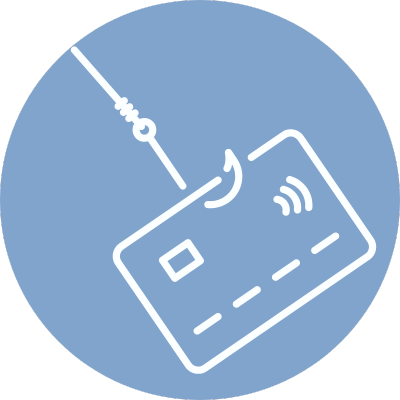
These days, fraudsters are more sophisticated than ever. Protect yourself by staying informed on financial scams!
Common Types of Fraud

Imposter Scams
Fraudsters will try to impersonate someone you know and trust.

Investment Scams
Scammers push a “sure thing” investment promising a deal or guaranteed return.

Card Fraud
Card information is stolen and used for purchases without the card being present.

Online Sale Scams
If an email or website offer seems too good to be true, it probably is.
How to Protect Yourself

- Protect Your Information:
- Never share sensitive personal information such as your bank account number, PIN, and online banking credentials.
- Use strong, unique passwords with two-factor authentication enabled.
- Don’t log into any of your banking via public Wi-Fi.
- Only Trust Verified Sources:
- Enable transaction alerts and check your accounts regularly for unauthorized transactions.
- While calls may come from one of our bank phone numbers, we will never ask for your passwords, PINs or security codes.
- Texts that come from the SBW Fraud Center will have a five-digit code and will never include a link.
- Take Your Time:
- Be wary of urgent messaging prompting you to act now or quickly.
- Review emails and texts, and listen to phone requests carefully to determine if it is Savings Bank of Walpole or not.
What to Do if You Suspect Fraud
- If you notice an unauthorized transactions call the bank immediately to report the issue and freeze or block your card if necessary.
- If you receive a suspicious call, email or text don’t share your personal details and call the bank directly.
What to Do if You Fell for a Scam
If you suspect you fell for a scam, call the bank immediately. You’ll likely want to update passwords or freeze the card depending on the scam.

Other Helpful Resources
Savings Bank of Walpole Partners with Banzai to bring you financial literacy tools. Check out their quizzes and articles:
Preventing Identify Theft
In today’s uber-connected online world, the risk of identity theft is hard to avoid. But there are ways to minimize identity theft risks and stay ahead of scammers and thieves who want your personal information
Protect Yourself Online
No matter how tech-savvy you are, cybersecurity should be top of mind any time you use the internet. If that sounds overwhelming, don’t stress. You don’t need to be an expert. Good cybersecurity isn’t complicated. There are basic cybersecurity rules anyone can follow.
Ransomware
Everyone has secrets—personal data, passwords, private documents, etc.—and people will spend lots of money to keep this information secret or gain access to it. Ransomware is just one way that hackers win access to personal information, expecting its owner will pay to win it back.
Compromised Information
Maybe you got a trustworthy notification that your information has been compromised. Or maybe you’ve noticed fraudulent activity on a card. Don’t panic, there are steps you can take. What’s most important is to act quickly and carefully to prevent any further damage and protect your identity.
50 Internet Safety Tips
Ramping up your cybersecurity awareness means learning how to stay safe online, and it’s the best way to keep your personal information (and money) safe from scammers. Here are 50 helpful internet safety tips to help you form cyber-safe online habits.
Digital Citizenship
Digital Citizenship allows teens and kids (recommended ages 9-15) to practice navigating through online decisions securely.
Recognizing and Avoiding Scams
Scammers are becoming more sophisticated in their tactics to exploit people. From phishing schemes to investment frauds, it’s hard to navigate the landscape of potential scams. Understanding the red flags and staying vigilant are crucial steps to safeguarding yourself from falling prey to scams in the digital age.
8 Internet Safety Rules for Kids
Since the internet has grown integral to communities worldwide, the question is not how do we help children refrain from using the web, but how we teach them the dangers of the internet. Here are eight rules kids should know before having unchaperoned access to technology.
Scams Targeting Seniors
Scammers target seniors more aggressively than any other group. Recognizing the most common scams helps prevent your money and personal information from getting stolen.
Romance & Dating Scams
They love me, they love me not. Here’s how you can prevent yourself from falling victim to some of the sneakiest crimes out there—romance scams.
7 Digital Citizenship Activities for Different Learning Styles
Some educators (parents and teachers alike) assume digital citizenship as a tricky subject to teach in part because kids are interacting with technology all day. In response to that, this article presents some fun activities anyone can use to teach kids how to recognize the dangers of an online world and become a good digital citizen—emphasis on good.
If you have any questions or concerns, please give us a call at (603) 352-1822 or (877) WALPOLE.
